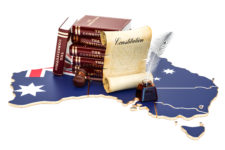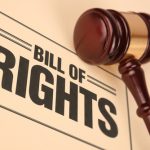The Australian Constitution Does Not Protect Our Rights

The AFP raids last year brought the issue of press freedoms front and centre. The bushfires led to heated debate over the potential for a class action against the government’s climate inaction. And concerns over the right to privacy have been ongoing since the 1980’s push for the Australia card.
Often, as these political debates are raging on social media, you’ll come across a comment that suggests the Australian Constitution protects citizens’ rights, and the government is simply failing to uphold them.
But the fact is this isn’t the case. It’s rather an idea popularised by the heavy cultural saturation the US media has had upon Australia in recent years. Since 1791, the United States has had a bill of rights which protects the freedoms of its citizens, and is enshrined in The US constitution and the amendments to that document.
By contrast, this nation’s founding document does not contain a bill of rights, and only provides protection for a handful of freedoms. And unlike all other western democracies, Australia is the only such country without a human rights act to provide individuals with freedoms and legal safeguards.
This means government can pass laws without considering whether they infringe upon citizens’ rights; without worrying about legal consequences. And this is what’s been happening for many years now.
Threadbare protections
Amongst the lawmakers that drafted the Australian Constitution, there was debate over whether a bill of rights should be contained in the document. But when it was put to the vote, the proposal lost out with 19 votes for and 23 against.
As noted by the Queensland chapter of the Young Presidents Association in 1997, the reason it didn’t fly was because of fears that rights protections would undermine a number of discriminatory laws that were in place at the time, which primarily disadvantaged First Nations people and Chinese residents.
So what was left was just five rights which are explicitly guaranteed by our Constitution. Section 41 provides of the document guarantees the right to vote. The protection of property against acquisition on unjust terms is protected by subsection 51(xxxi) of the document.
The right to a trial by jury is contained in section 80; but it should be noted that over the years, the courts have found that this right only extends to trial by indictment; in other words, trials in the higher courts such as the District and Supreme Courts. Freedom of religion is protected under section 116 of the document, while section 117 prohibits discrimination based on state of residency.
In addition to these explicit rights, the High Court found in the 1992 case of Australian Capital Television versus the Commonwealth that, taken together, sections 7 and 24 of the Constitution imply a qualified right of political communication.
Th ABC case enabled former Australian Greens leader Bob Brown to successfully challenge 2014 anti-protest laws that had been passed in Tasmania. Indeed, the High Court reasoned in October 2017 that these laws contravened the implied right of political communication by deterring protesters.
Checking in with authorities
Former NSW Council of Civil Liberties president Stephen Blanks told Sydney Criminal Lawyers in 2017 that “one of the problems with the Australian legal system now is that if people’s human rights are infringed” the only recourse is to “make a complaint to the Australian Human Rights Commission”.
Mr Blanks advocates for the establishment of a federal human rights act. He sees this an interim measure, prior to the amendment of the Constitution, so that it incorporates a rights protection bill within it. Amending the US Constitution is what happened with the bill of rights over there.
Constitutional law expert UNSW Scientia Professor George Williams explained in November 2017 that the need for Australian human rights protections has become more urgent since the government set about passing multiple rights eroding national security bills post-9/11.
The professor explained that compared to nations with rights protections – such as the US and the UK – Australia has passed a much greater volume of national security-counterterrorism laws that “go further”. And the number of these sorts of bills that have been passed at the federal is up around 80.
At the moment, the Australian Bill of Rights Bill 2019 is sitting before federal parliament. It was introduced by federal MP Andrew Wilkie. And it’s the second such rights protection bill the independent member has tabled over the past few years.
“The value of a bill of rights has become more important, because of the increasing power of the state,” Mr Wilkie said in 2017, just after he introduced the first bill. “And many people feel that their rights have been eroded on account of laws that have been passed by a range of governments.”
A case in point
Concerns have long been raised around NSW consorting laws that were passed in 2012. This occurred initially as they were introduced, as well as a few years later when NSW Greens MLC David Shoebridge released statistics that revealed the biased way in which these laws had been applied.
Section 93X of the Crimes Act 1900 (NSW) makes it an offence for an individual to communicate with at least two convicted criminals, after they’ve been warned not to by police. And an offender doesn’t have to have fallen short of the law in the past, and they can be sent away for up to 3 years.
In 2014, three men who’d been charged under these laws challenged their validity in the High Court, arguing that they impinged upon the implied right of association in the Constitution. However, the court dismissed the appeal, as it found that no such right exists under Australia’s federal law.
What the bloody hell is Morrison up to?
“So long as the agenda is driven by people whose interest is primarily power, rather than the public good,” Blanks explained, “it’s very difficult to get a coalition in favour of human rights legislation.” Indeed, the current federal system sees rights eroding bills swept through with bipartisan support.
And at present, we’ve got a prime minister who’s trying to ram through legislation that aims to uphold one right over all others. And this is one of the few rights that’s already provided protection under the Constitution: the right to freedom of religion.
Scott Morrison’s pet project – the Religious Discrimination Bill 2019 – doesn’t simply aim to guarantee religious freedoms, but it also undermines both federal and state anti-discrimination frameworks that have been built up since the 1970s, if a breach is conducted in the name of faith.
And while many are confused as to why our PM is prioritising religion at this point in time, one thing is certain, and that is there’s no federal legislation guaranteeing citizens’ rights that the “bigots’ bill” can be weighed up against to see if it infringes upon the rights of minorities, as it certainly does.








